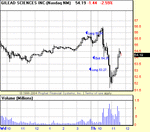You are using an out of date browser. It may not display this or other websites correctly.
You should upgrade or use an alternative browser.
You should upgrade or use an alternative browser.
Mr. Charts
Legendary member
- Messages
- 7,370
- Likes
- 1,200
dvh,
I am not Naz.
We are friends but are completely different people!
And no I wasn't using that scanner.
Hi Tim,
I followed my standard one minute candle exit rules.
Richard
I am not Naz.
We are friends but are completely different people!
And no I wasn't using that scanner.
Hi Tim,
I followed my standard one minute candle exit rules.
Richard
Geting a grip
In an attempt to learn something, I have just been analysing Mr Charts corker from yesterday, and I am probably just stating the obvious but its interesting that traders just observing the chart for the stock would probably have come to totally different conclusions about the stock depending on the bar interval being used, for example the hammer just before the entry doesn't show on the 5 minute chart also that hammer on the one minute (plus the small bull after) may have tempted a few viewing just the chart to go long because it was on decent volume.
In an attempt to learn something, I have just been analysing Mr Charts corker from yesterday, and I am probably just stating the obvious but its interesting that traders just observing the chart for the stock would probably have come to totally different conclusions about the stock depending on the bar interval being used, for example the hammer just before the entry doesn't show on the 5 minute chart also that hammer on the one minute (plus the small bull after) may have tempted a few viewing just the chart to go long because it was on decent volume.
Mr. Charts
Legendary member
- Messages
- 7,370
- Likes
- 1,200
samtron,
Although all analogies break down if pushed too far, here's one way of looking at this:
daily chart = forest
5 min chart = group of trees in a local eco-system
1 min chart = looking at individual trees in a row
micro-analysis = examining each tree to see if it is growing or diseased, half pecked/sawn through etc.
OK, I know it's not the best of analogies, but you get the point.
View something from different aspects, and in all dimensions if you want to really see what is going on.
One of the reasons why so many people find shares hard to profit from is that they think all they need to do is just look at the trees without examining them.........
It's not easy, I'm not saying it is, but like driving, if you persist it's extremely worthwhile.
Not everyone can do it, minds work differently, but if you know what to look for, and practice, practice,practice, you can read the story when others can't - a bit like forensic medicine.
Richard
Although all analogies break down if pushed too far, here's one way of looking at this:
daily chart = forest
5 min chart = group of trees in a local eco-system
1 min chart = looking at individual trees in a row
micro-analysis = examining each tree to see if it is growing or diseased, half pecked/sawn through etc.
OK, I know it's not the best of analogies, but you get the point.
View something from different aspects, and in all dimensions if you want to really see what is going on.
One of the reasons why so many people find shares hard to profit from is that they think all they need to do is just look at the trees without examining them.........
It's not easy, I'm not saying it is, but like driving, if you persist it's extremely worthwhile.
Not everyone can do it, minds work differently, but if you know what to look for, and practice, practice,practice, you can read the story when others can't - a bit like forensic medicine.
Richard
Mr. Charts said:dvh,
I am not Naz.
We are friends but are completely different people!
And no I wasn't using that scanner.
Richard,
I know you're not Naz, but I'd like to know if Alan's new Via-Trader scanner, which is about to be released I think, found that SFCC trade?? But Naz hasn't posted for a while!
-Dave.
neil
Legendary member
- Messages
- 5,169
- Likes
- 754
davevandenheuvel said:Richard,
I know you're not Naz, but I'd like to know if Alan's new Via-Trader scanner, which is about to be released I think, found that SFCC trade?? But Naz hasn't posted for a while!
-Dave.
Send Naz a PM - he is quite approachable 😀
PitBull
Established member
- Messages
- 620
- Likes
- 59
Results for today:
2 losses, 1 scratch and 3 winners.
Let me deal with the losses first.
Went long on KLAC on 3 bar break, but didn't wait for the third bar to finish. Quickly reversed and got stopped out for -0.25
Next loss. These losses are unavoidable. Completely news related as mentioned in earlier post. It set itself up as a lovely U move and when it took out the highs I was long. Entry 56.05, about 30mins later or so. It dropped out of teh sky based on some silly bird flu enquiry. So, lucky my stop was in place. -0.25
Scratch trade: YHOO. Entered long @ 40.73, had trouble getting through 41. Just like last night, this one seems not to like the whole numbers. Must remember not to enter close to whole number on this one. So cut the trade breakeven.
Now the winners:
ZMH, gapped down and went short after 15min range broke. Entry 63.56, exit 62.65. +0.91
KLAC, had another go at this one as it had all the hallmarks of a reversal from the leg up after gap down. In short at 50.69, exit 50.42. +0.27
Last but not least, is INTU. This baby kept on going and going!
Gapped up in long after range breakout. Entry 50.33, sold half @ 51.15, remainder run until 52.50. Average = +1.08
Total = $1.76
See attached charts. Apologies there are quite a few!
2 losses, 1 scratch and 3 winners.
Let me deal with the losses first.
Went long on KLAC on 3 bar break, but didn't wait for the third bar to finish. Quickly reversed and got stopped out for -0.25
Next loss. These losses are unavoidable. Completely news related as mentioned in earlier post. It set itself up as a lovely U move and when it took out the highs I was long. Entry 56.05, about 30mins later or so. It dropped out of teh sky based on some silly bird flu enquiry. So, lucky my stop was in place. -0.25
Scratch trade: YHOO. Entered long @ 40.73, had trouble getting through 41. Just like last night, this one seems not to like the whole numbers. Must remember not to enter close to whole number on this one. So cut the trade breakeven.
Now the winners:
ZMH, gapped down and went short after 15min range broke. Entry 63.56, exit 62.65. +0.91
KLAC, had another go at this one as it had all the hallmarks of a reversal from the leg up after gap down. In short at 50.69, exit 50.42. +0.27
Last but not least, is INTU. This baby kept on going and going!
Gapped up in long after range breakout. Entry 50.33, sold half @ 51.15, remainder run until 52.50. Average = +1.08
Total = $1.76
See attached charts. Apologies there are quite a few!
Attachments
-
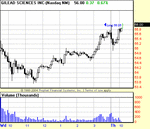 GILD171105entry.gif9.9 KB · Views: 259
GILD171105entry.gif9.9 KB · Views: 259 -
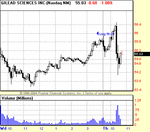 GILD171105exit.gif10 KB · Views: 280
GILD171105exit.gif10 KB · Views: 280 -
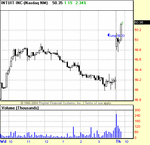 INTU171105entry.gif10.2 KB · Views: 242
INTU171105entry.gif10.2 KB · Views: 242 -
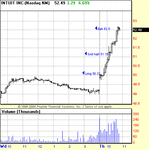 INTU171105exit.gif10.3 KB · Views: 252
INTU171105exit.gif10.3 KB · Views: 252 -
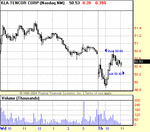 KLAC171105.gif10.3 KB · Views: 235
KLAC171105.gif10.3 KB · Views: 235 -
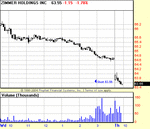 ZMH171105entry.gif8.9 KB · Views: 240
ZMH171105entry.gif8.9 KB · Views: 240 -
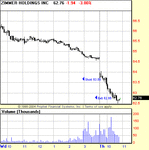 ZMH171105exit.gif9.9 KB · Views: 244
ZMH171105exit.gif9.9 KB · Views: 244 -
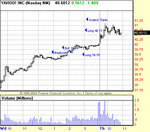 YHOO171105.gif10 KB · Views: 222
YHOO171105.gif10 KB · Views: 222
PitBull
Established member
- Messages
- 620
- Likes
- 59
On fire..
As things seem to be going quite well, a quick scan at GILD and it has set itself up lovely for a bounce up after such a sudden fall. This was an easy $1 run in 10 minutes.
Entry long 53.27, exit 54.35 = +1.08
Therefore, total for today $2.84
As things seem to be going quite well, a quick scan at GILD and it has set itself up lovely for a bounce up after such a sudden fall. This was an easy $1 run in 10 minutes.
Entry long 53.27, exit 54.35 = +1.08
Therefore, total for today $2.84
Attachments
Mr. Charts
Legendary member
- Messages
- 7,370
- Likes
- 1,200
Well done, Pitbull, nice trading.
I also traded GILD on the retracement on the big fall plus the bounce as you did though at different levels.
INTU, TARO and CNTF also produced very profitable trades for me this afternoon.
All on an afternoon when the indices/futures did zilch. This is one of the great things about trading US stocks, you can almost always find great high probability trades even when the market is flat.
Richard
I also traded GILD on the retracement on the big fall plus the bounce as you did though at different levels.
INTU, TARO and CNTF also produced very profitable trades for me this afternoon.
All on an afternoon when the indices/futures did zilch. This is one of the great things about trading US stocks, you can almost always find great high probability trades even when the market is flat.
Richard
PitBull
Established member
- Messages
- 620
- Likes
- 59
Mr C
There are SO MANY opportunities in this market it is flipping fantastic!!
TARO was on my watchlist also, but just had to manage the trades that were open. As you say, multi-tasking.
Quick question if I may. What is your maximum number of trades you would have open at the same time?
There are SO MANY opportunities in this market it is flipping fantastic!!
TARO was on my watchlist also, but just had to manage the trades that were open. As you say, multi-tasking.
Quick question if I may. What is your maximum number of trades you would have open at the same time?
Mr. Charts
Legendary member
- Messages
- 7,370
- Likes
- 1,200
Hiya Pitbull,
I can watch four open trades at a time comfortably. More than that and I can't watch level 2 as closely as I like.
I forgot to mention earlier I also grabbed a very quick $ from GOOG. I KNEW when it fell through 400 all the stops would be triggered and it would bounce right back having taken them all out.
To be brutally frank, it does help to know where all the amateurs are going to trade.......... ;-)
I'm done for today.
Another great week so far, huh? ;-)
Don't you just l-u-r-v-e the US market ;-)
Richard
I can watch four open trades at a time comfortably. More than that and I can't watch level 2 as closely as I like.
I forgot to mention earlier I also grabbed a very quick $ from GOOG. I KNEW when it fell through 400 all the stops would be triggered and it would bounce right back having taken them all out.
To be brutally frank, it does help to know where all the amateurs are going to trade.......... ;-)
I'm done for today.
Another great week so far, huh? ;-)
Don't you just l-u-r-v-e the US market ;-)
Richard
PitBull said:See attached charts. Apologies there are quite a few!
No complaints from me PB 🙂 they'r greaaaaaaaat!
Mr Charts,
Thanks very much for the analogy you gave earlier, (forest and trees), things like that do help.
timsk
Legendary member
- Messages
- 8,834
- Likes
- 3,538
Hi PitBull,PitBull said:Timsk
I wonder if you could clarify why you would scramble for cover when your'e in a profitable trade, you've trailed your stop, but with enough room to not get stopped out. Would it be fear of losing those profits?
Just curious of your thought process in a great trade like this one.
Many thanks
Very well done on your trading - not just today - but since you've actively posted on this board. Very encouraging for the rest of us!
Now, to answer your question, Suppose you're in a trade - any trade - and it's going very much in your favour. You're well up and very happy. That said, you're a pro (hey - we're talking about Richard here after all 😉) so your emotions are in check. Trading at a profit or trading at a loss does not impact your emotions greatly - either way. That said, Richard's attention must have been very, very focused indeed when his short position seemingly hit rock bottom and buyers appeared in their droves and forced the price back up from whence it had just come within the space of a minute. If Richard had a trailing stop placed as a pending market order, it must have been quite a long way from the actual price action at any one time. I don't know, but I suspect that his stops are 'mental', rather than 'actual' pending orders placed on his trading platform. I would stress that this is just a guess on my part and is not based on anything Richard has said. Certainly, if this is his practice, it is not one that he would recommend to anyone other than a very experienced and profitable market practitioner. So, I suspect he had a mental trailing stop that he would exercise in an instant when his 'micro analysis' told him that the fundamental (sorry for swearing) balance between sellers and buyers had shifted in favour of the latter. This is what interests me and prompted my initial question. The price retraced over a dollar against his position, yet he did not cover. Why? Most traders, I suspect, would have covered for a good profit and, as you say, for fear of giving back their profits which, as most of us know, is the most bitter pill of all to swallow. To conclude, Mr. C' either got lucky - VERY lucky - or his assessment of market sentiment told him that the rally from buyers would be a relatively short lived affair (no pun intended) and that the sellers would prevail and dominate proceedings for a while to come. Whatever his reasoning, clearly he was right and he finally covered his position for a much greater profit than he might otherwise have done.
The point of all of this is to do with exit strategy which, I humbly submit, is the hardest part of trading. Most traders, especially newbies focus on the entry. This isn't the important bit. The very best traders - of which Richard is one, know exactly when to get out and do so without any hesitation, regardless of whether the trade is profitable or not. A bit of a garbled post - but I hope it is clear nonetheless?
Tim.
Last edited:
PitBull
Established member
- Messages
- 620
- Likes
- 59
Timsk
Great response. Totally understand.
I suppose it was a bit of a naive question from me, as after looking at the chart, I too spotted that it was over a dollar retracement, where the buyers forced the price up. Me and most others, as you say, would be scrambling for the door, so where is the microanalysis in a dollar retracement which would keep you in the trade? At 1000 shares thats $1000's against your position.
All the best
Lee
Great response. Totally understand.
I suppose it was a bit of a naive question from me, as after looking at the chart, I too spotted that it was over a dollar retracement, where the buyers forced the price up. Me and most others, as you say, would be scrambling for the door, so where is the microanalysis in a dollar retracement which would keep you in the trade? At 1000 shares thats $1000's against your position.
All the best
Lee
Similar threads
- Replies
- 775
- Views
- 218K

